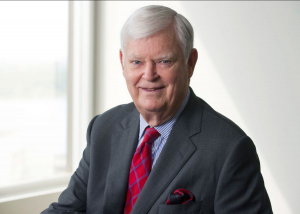Here is the official release:
It is with great sadness that we announce that Joseph L. Hudson, Jr. passed away peacefully this morning at his home.
On behalf of the Hudson-Webber Foundation’s Board of Trustees and staff, we send our deepest condolences to Jean, Mr. Hudson’s loving wife, and to the entire Hudson family.
As we grieve this moment, we also celebrate the incomparable career and legacy of a true leader in the worlds of philanthropy, social justice and service to the needs of the greater community. Since his arrival in Detroit as a teenager, Mr. Hudson’s lifelong dedication to the advancement of the people and institutions that make up our city, region and state has been a driving force in the story of our community’s continuous re-invention and revitalization.
May his example continue to inspire each of us to bring people of good will together to enrich and improve the world that has been left in our care.
Melanca Clark
President and CEO
In accordance with the family’s wishes, memorial gifts in Joseph L. Hudson Jr.’s name can be made in any amount to the Community Foundation for Southeast Michigan’s COVID-19 Relief Fund at https://cfsem.org/covid19-relief/, and the Michigan Justice Fund at https://cfsem.org/initiative/michigan-justice-fund/.
Here is the official obituary:
DETROIT – Joseph L. Hudson, Jr. passed away peacefully on the morning of Dec. 2, 2020, at his home in Grosse Pointe Farms, Michigan. He was 89 years old. Since arriving in Detroit in the 1940s, Hudson spent over seven decades as a driving force in the formation and development of what have become foundational institutions in the fields of philanthropy, social justice and economic development for the city, state and region. Joseph Lowthian Hudson, Jr., was born in Buffalo, New York, on July 4, 1931, the son of Joseph L. and Elizabeth (Gilbert) Hudson. He married Jean Bent Wright in 1952, his lifelong partner, and he is survived by the couple’s four children, 10 grandchildren, and five great-grandchildren. Hudson joined The J. L. Hudson Company following graduation from Yale University in 1953. Between 1954 and 1956, he served as a first lieutenant artillery officer with the U.S. Army in Germany. In 1956, he returned to Hudson’s, was elected a vice president in 1957, and in 1961 became president and chief executive officer. He served the company until his retirement from The J. L. Hudson Company and Dayton Hudson Corporation in 1982. In 1956, Hudson was elected to the board of trustees of the Hudson-Webber Foundation and served as president, and later chairman from 1961 until his retirement from that office in 1996. He continued to serve as a lifetime honorary trustee. The Hudson-Webber Foundation, with assets of approximately $175 million dollars, is committed to improving the vitality and quality of life in Detroit through support of community and economic development, built environment, safe and just communities, and arts and culture. In 1985, Hudson was elected the first president and chief executive officer of the newly merged Detroit Medical Center, and served until his retirement in 1990. The Detroit Medical Center
Page 2 of 3
consists of seven subsidiary hospitals affiliated with Wayne State University and its School of Medicine. He had previously served on the board and as chairman of Harper Hospital. Over the years in addition to Dayton Hudson Corporation, Hudson served as a director of National Bank of Detroit, Detroit Edison, Michigan Bell Telephone Company, National Steel, Bundy Corporation, Masco Corporation, and McCormick Oil & Gas.
In the wake of Detroit’s civil unrest in July 1967, Governor George Romney and Detroit Mayor Jerome Cavanagh appointed Hudson as the first chairman of the New Detroit Committee, a 39member coalition composed of business, labor, governmental, and civic leaders, including militant and moderate spokespersons for the African American community in Detroit. Hudson served as chairman until 1968, and continued to serve on the board of trustees of New Detroit, Inc. through the 1980s.
In 1984, Hudson convened leaders of the community to create the Community Foundation for Southeast Michigan and served as its founding chair until 2003, and continued as a trustee. Hudson’s other civic and community involvement included service on the City of Detroit Arts Commission (Detroit Institute of Arts) where he served as president from 1979-1990; longtime trustee and trustee emeritus Detroit Institute of Arts, director of Detroit Renaissance (19902007.) He chaired the annual campaign and later served as president of the United Foundation, now known as United Way. He also served as a trustee and president of the Tannahill Foundation. Among his many civic and professional recognitions, Hudson was presented with the Alan E. Schwartz Community Leader Award; the Governor’s Award for Arts and Culture; the Lifetime Service Award from the Detroit Institute of Arts; the Max M. Fisher Community Service Award from United Way Community Services; the George W. Romney Award for Lifetime Achievement in Voluntarism; the Arts Foundation of Michigan Patron Award and the Greater Detroit Chamber of Commerce Summit Award; the 1983 Distinguished Network Service Award given by the National Urban Coalition; the Mercy National Human Relations Award given by the Greater Detroit Round Table of the National Conference of Christians and Jews; the B’nai B’rith Humanitarian Award; and the 1960 Detroit Junior Board of Commerce Distinguished Service Award as Outstanding Young Man of the Year. In 1983, he received honorary doctor of humanities degrees from the University of Detroit and Wayne State University. In 1978, Hudson received an honorary doctor of humanities degree from Michigan State University, and in 1974, Wayne State University awarded him the Builders of Detroit Award. In accordance with the family’s wishes, memorial gifts in Joseph L. Hudson Jr.’s name can be made in any amount to the Community Foundation for Southeast Michigan’s COVID-19 Relief Fund at https://cfsem.org/covid19-relief/, and the Michigan Justice Fund at https://cfsem.org/initiative/michigan-justice-fund/.
Page 3 of 3
ABOUT the Hudson-Webber Foundation The Hudson-Webber Foundation’s origins date back to 1939 with major contributions



